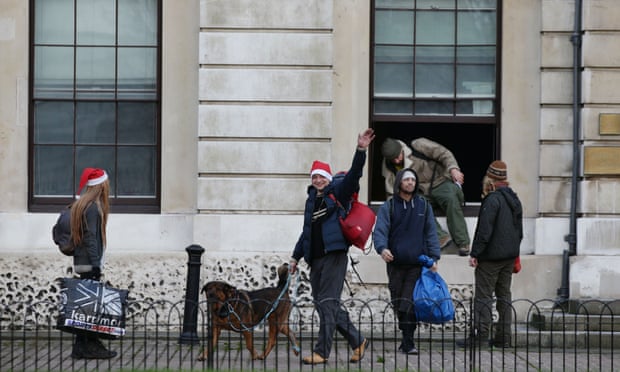As empty buildings go, they don’t come more stunning than the former Royal Mint, which I spent time this week occupying with other campaigners. The Grade II listed building in central London has a huge amount of space, is in perfect condition internally, has a magnificent courtyard, and the location could not be more prominent. It’s across the road from the Tower of London world heritage site and on the edge of the City.
The reason for the occupation, which ended on Thursday, is that we need a change in the system. We chose the iconic location to stage a housing protest, for several reasons. We wanted to raise awareness of the need to reuse empty buildings as well as to highlight growing homelessness (absurd when, as the Guardian tells us, housebuilders are holding on to enough space to build 600,000 homes), the criminalisation of residential squatting, and the government’s austerity programme, which is rapidly placing our public assets in private hands.
This old centre of finance, where the right to create currency was granted, seemed the perfect place to remind the public that the banks were bailed out to the tune of hundreds of billions by the British people.
We have a system now that means houses are not homes but investments, and we wanted to highlight one of the big disconnects of the 21st century – a growing problem of homelessness combined with a huge number of empty buildings. According to the Empty Homes Agency there are 600,000 empty homes in England alone.
This does not include the hundreds of thousands of empty commercial properties. Linking up those who are sleeping outside with empty buildings, providing them with temporary shelter until the buildings are redeveloped, would be a win-win situation. Taking such a step would be a sustainable use of empty space, and formalising such arrangements would enable property owners to avoid the court and security costs needed to keep the buildings free of people.
Over the last 25 years we have seen too many empty buildings, most of which could provide temporary shelter for people freezing on the streets – rough sleepers who include everyone from 15-year-old runaways to former soldiers.
Our society is affluent and supposedly civilised, and we have the capacity to look after the most vulnerable. Potentially, every single one of us could find ourselves homeless if we lost our job or experienced a relationship break up.
The welfare safety net is being systematically and deliberately dismantled. Squatting has become one of the few survival options left for vulnerable people on the margins, who find themselves entirely without support.
With the blessing of the government, wealthy developers are engaging in social cleansing, especially in London. Housing estates around London, like the Heygate, have been sold off and developed into mostly very expensive housing. Most people even on good wages can’t afford London prices. The generation under 35 are seeing their chances of owning their own home dwindling to nothing.
Residential squatting has been criminalised despite the opposition of the vast majority of the replies to the government’s consultation, which included contributions by the judiciary, police, lawyers, housing groups and homeless charities.
It’s time for common sense to prevail. It should be enshrined in legislation that buildings which are empty for more than six months should be used to provide community and cultural project space or temporary accommodation for homeless people. We need solutions to provide a better future for our children. Small actions like our occupation can lead to big social changes. The right to shelter is a basic human right.

No comments:
Post a Comment